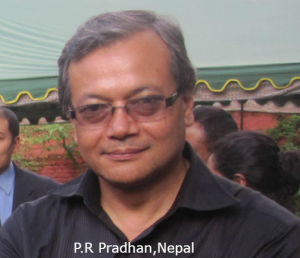-Pushpa Raj Pradhan
Chief Editor
People’s Review weekly
Kathmandu, Nepal

Begin text.
The present coalition government was formed primarily at the initiative of New Delhi. After the general elections last year, the then-prime minister, Sher Bahadur Deuba, under the instruction of Delhi, refused to hand over power to Pushpakamal Dahal. The Indian intelligence stationed in town was confident that Dahal would not break the alliance and accept Deuba further. The Indians felt that Deuba could be more comfortable than Dahal, therefore, they advised Deuba to not quit the PM’s post.
Overnight, when Dahal developed an alliance with the UML and formed the government, the Indians were puzzled. The Indians then started course correction attempts. They warned Dahal to end the alliance with the UML and continue the previous alliance. Dahal saw that his political future could face a crisis if he didn’t respond to the Indians. Under the Indian initiative, Dahal, Deuba and Madhav Nepal agreed to share the PM’s post turn by turn. Now, the three leaders are in a race to please the Indians to fulfil their pity interests of enjoying power.
When the three leaders were found very favorable for India, the Indian leaders started to use these leaders to fulfilling their vested interests. The then prime minister Sher Bahadur Deuba, when he was visiting Delhi, went to the BJP headquarters by violating the protocol norms. He publicly said that key hydropower projects should be handed over to India on the grounds that India would not import electricity produced through the investment of third countries—especially indicating towards the Chinese investment. In the race to please India, Prime Minister Dahal, during his official visit to Delhi, agreed to a power export deal for 25 years.
{Google-ads)
The deal has not been made public until now. Hydropower experts say that Nepal has not only handed over the sole authority to India for exporting hydropower but also handed over Nepal’s rights to our rivers. Water is important for India and experts believe, the present Dahal-led government agreed to hand over our rivers to India free of cost. A dream has been distributed that Nepal will become prosperous from exports of electricity to India, which is not true. The Nepal Electricity Authority has not disclosed the net profit that Nepal has gained from the exports of electricity to India. It means this is also a loss business.
PM Dahal, upon his return from Delhi, publicly said that he didn’t raise other issues, including India’s denial of approving the EPG report, border dispute, and new air routes, among others, which may upset the mood of his Indian counterpart, Narendra Modi.
Following the visit of Indian Foreign Minister S Jaaishankar, Nepal allowed the authority to spend up to 200 million rupees on any of the community projects by the Indian Embassy in any part of the country. This is a very serious issue for Nepal, whereas, a fruitful project for India. When India was distributing 50 million rupees in community projects, we could see sitting MPs and local-level political leaders standing in a queue to meet the Indian diplomats and requesting Indian projects in their electoral constituencies. Now, the limit has been inclined to 200 million rupees, what will be the scenario at the Indian Embassy, we can imagine. India is not going to spend such a huge amount without any vested interests. The Indians are trying to manipulate the Nepali nationals and the present weak coalition government has given free hands to the Indians.
{Google-ads)
Of late, PM Dahal and his partners in the alliance government are planning to hand over all three international airports to the Indians, which is an issue of security sensitiveness.
Personally, talking about PM Dahal, he is serving India as well as the West but making China fool. PM Dahal and the partners in the alliance government, in the process of pleasing India, have neglected China and discouraged Chinese investments.

A secret commitment that the present government has made with their Indian bosses is that they would play a visible role in reducing the Chinese presence in Nepal.
The present scenario is that there is a visible presence of the USA in Nepal. The USA has its own interests here. The European countries are openly campaigning for Christianity. The Indians are intensifying their presence in Nepal intended with different strategies. They include Bhutanization, Fijinization, Kashmirization, Sikkimization, and the split of the Tarai district from Nepal, among others. Meanwhile, Western countries have found Nepal a fertile land for monitoring Chinese and Indian activities. When India and the West increase their activities in Nepal, it becomes obvious for China to play an assertive role in countering India and the West.
Earlier, when the institution of monarchy existed in Nepal, it stood as a security wall between India and China. Nepali monarchs performed the key role of respecting the security sensitiveness of both the neighbors, which has become vulnerable now. We see the possibility of a big tussle among the foreign powers on Nepali soil shortly.
# published in the People’s Review weekly February 21, 2024: Ed. Upadhyaya.
{Google-ads)
